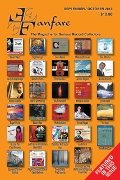Texte paru dans: / Appeared in:

Fanfare Magazine: 37:1 (09-10/2013)
Pour
s'abonner / Subscription information
Les abonnés à Fanfare Magazine ont accès aux archives du
magazine sur internet.
Subscribers to Fanfare Magazine have access to the archives of the magazine
on the net.
Harmonia
Mundi
HM807587

Code-barres / Barcode
: 0093046758769
Consultez toutes les évaluations recensées pour ce cd
~~~~ Reach all the evaluations located for this CD
Psalm 109, Dixit Dominus, was a particularly popular text for settings during the 18th century, with almost every major composer (and most minor ones) writing one. Here we have two by the principal figures of the late Baroque who need no further identification. Suffice it to say that George Frederick Handel’s eight-movement work from 1707 has been done fairly frequently by various early-music groups. I have found the 2001 version with John Eliot Gardiner and his English Baroque Soloists on Philips a particular favorite, but of course there is a plethora of others of equal excellence to choose from. Vivaldi’s spectacular tour de force motet In furore iustissimae has likewise been often recorded, as it is the perfect display piece for sopranos to demonstrate their dexterity and skill at performing Vivaldi’s sometimes tortuous virtuoso lines in the first aria and the slow passacaglia of the second, where the soprano has to float ethereally as she depicts weeping. And of course, there is the Alleluia, where Vivaldi emphasized the repeated first syllable in a most suspicious manner, in contrast to other composers who use the fluid vowels for their focus. I like the Accademia Bizantina performance from 2006 on Naïve, though there are others I like equally as well. The only odd work out is Vivaldi’s third setting, RV 807, which was only discovered in 2005; up to that time it had masqueraded as the work of Baldassare Galuppi, thanks to an errant copyist’s mistaken attribution. Barring the obvious issue of how this thoroughly Vivaldian work could ever have been said to be by Galuppi, it has now become one of the canon, with a nice performance on Archiv by the Dresdener Instrumental Ensemble in 2006.
This of course brings us to this disc, by La Nuova Musica, founded about five years ago by David Bates, which ironically enough seems to have specialized thus far in the music of Handel, even though it takes its name from Giulio Caccini’s seminal treatise of 1602. Their hook seems to be, as in other new generation early-music ensembles, to draw the soloists from within the ranks of the chorus, which they do here for everything but the motet. The last is performed by Lucy Crowe, who gives a brilliant and exciting interpretation, even during the da capo of the first aria beginning on a tension-filled high note, swooping down to catch Handel’s rapid melismas like a bird of prey. When compared with her poignant second aria and the punctuations of the Alleluia, it makes for an exciting interlude, which even her tendency sometimes to be slightly under pitch at the high points does not mar.
For the Vivaldi, the ensemble handles the often insistent figurations of both chorus and strings with power and decisiveness. This is particularly evident in places, like the Tecum principium, where the two tenors weave in and around each other in meandering lines above what can only be described as a jaunty tune in the orchestra. Tenors Simon Wall and Rom Raskin have light voices that contain just the right amount of flexibility both to blend well and to complement each other. The former’s solo in the Dominus a dextris tuis is quite florid, and he negotiates it with concerted ease and precision. The real telling point in the Dixit is the De torrente, which is handled quite differently in the two works. The Vivaldi has a susurrating and pulsing accompaniment that frames countertenor Christopher Lowrey’s clear phrasing, while in the Handel, the two sopranos, Augusta Hebbert and Anna Dennis, adapt to the slow, meandering suspensions by emerging mysteriously from out of the string textures (a technique Handel also allows his chorus in the same movement to do). The other sopranos also have nice moments of display. Helen-James Howells is a bit shrill in her upper registers in her first aria, Virgam virtutis, by Vivaldi, but when she joins Esther Brazil in the Gloria patri, the blend is pure and unified, making this suspensive duet above a walking bass most effective. The choral movements are also well done, showing that Bates has a group of well-blending and disciplined singers at his command. The insistent, even mechanical perpetual motion of the orchestra in the opening movement of the Handel is offset by the monumental homophonic choral parts, and in the antiphonal Juravit Dominus, the solemn block chords that devolve into echo effects among the choral voices before fading out mysteriously are almost magical.
In short, this is a terrific
disc, despite the occasional (and very brief) intonational glitches of some
of the singers. The tempos are right in line with the Affekt of the text,
the chorus and orchestra blend well together and there is a nice energy to
the performances. My only quibble here is that the sound is occasionally a
bit woolly, which is probably the result of some technical microphone
placement or perhaps the resonance of the recording venue itself. Still,
this is a disc that would be an excellent addition to one’s collection,
particularly in view of the fewer options on Vivaldi’s third Dixit.
Fermer la fenêtre/Close window
Cliquez l'un ou l'autre
bouton pour découvrir bien d'autres critiques de CD
Click either button for many other reviews


